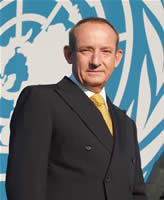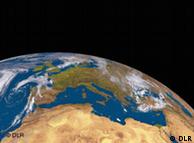
MONTREAL, Quebec, Canada, September 17, 2007 (ENS) - Refrigerating and air conditioning today employ hydrochlorofluorocarbons, HCFCs - chemicals that by international agreement have replaced other chemicals known to damage the Earth's ozone layer. But now HCFCs have fallen out of favor because they too deplete the ozone layer and also act as greenhouse gases contributing to global warming.
Today in Montreal, representatives of 191 governments opened a four day conference at which they will try to speed up the phaseout of both production and consumption of HCFCs. They are seeking solutions that can both protect the ozone layer and help to stabilize the climate.
The largest ever Antarctic ozone hole, recorded on September 10, 2000, when it covered 11.5 million square miles. (Image courtesy TOMS science team NASA)
The governments are Parties to the Montreal Protocol on Substances that Deplete the Ozone Layer, which on Sunday marked its 20th anniversary with a seminar entitled “Celebrating 20 Years of Progress.”
Hosted by Environment Canada and the UN Environment Programme, UNEP, which is responsible for the Montreal Protocol, the seminar was held at the Palais de Congrès in Montreal, Canada, in advance of the conference negotiations.
Participants from governments, international organizations, business and NGOs took part in the keynote presentations and panel discussions on the history, development and implementation of the Montreal Protocol, ozone science, and links with other environmental issues such as climate change
Read More
 Fri Dec 28, 2007
Fri Dec 28, 2007



































